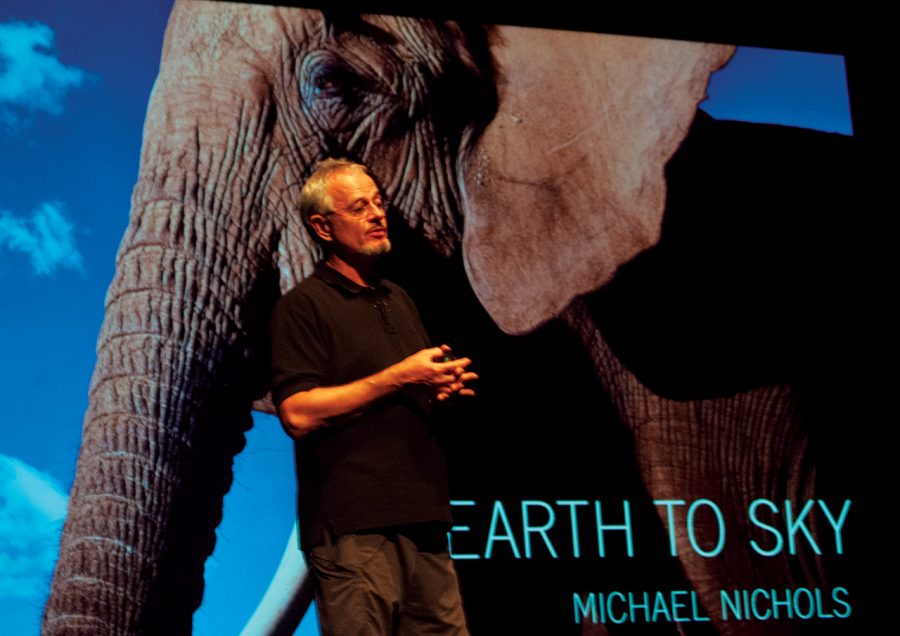Alumnus Nick Nichols discusses photography, finding jobs
October 24, 2013
The words “Lions, Elephants and Giants” covered the back wall of the Norton Auditorium stage on Friday, Oct. 18 as alumnus Michael “Nick” Nichols, National Geographic editor-at-large, spoke to the community about his photography — both personal and for the magazine.
The first of the Distinguished Events Series for the 2013-2014 school year, Nichols’ presentation was preceded by an introduction by President William Cale and the reading of a Proclamation of Recognition by business professor and Colbert County Commissioner David Black.
“I’m told that wherever he went on campus he was always seen with a camera around his neck and a booksack on his shoulder,” Cale said. “The suspicion is that the booksack didn’t really contain books, it contained additional camera lenses, film and other paraphernelia for his photography.”
Nichols photography career began when he was drafted into the U.S. Army’s photography unit, according to his online biography. He became a staff photographer for National Geographic in 1996 and became editor-at-large in 2008.
In 2007, Nichols founded the Charlottesville, Va. LOOK3 Festival of the Photograph.
“This three-day celebration of peace, love and photography creates a space for photographers to meet as a community of equals, to be renewed, and to share their views with a broader audience,” his website reads.
Nichols involvement with his photography is strictly professional, he said. While in Africa observing mountain gorillas, he noticed the police chief’s son attempting to sell a baby gorilla.
“That was the day that I thought, ‘Am I going to walk away from this gorilla?’,” Nichols said. “‘Am I going to photograph it or am I going to save it?’ And what you do when you’re in my position is you walk away or you become an activist on the spot. As long as I’m working, that’s not my job. I don’t do it lightly. I cried that night. But I couldn’t take that gorilla. What was I going to do with it? It was going to become my life if I took it.”
Observing nature take its course has been fairly easy, he said.
“If I see a lion killing another lion I’m not going to do anything,” he said. “That’s the natural order. I’m just there to document. It’s not that you do it without cost, but if you get involved then you’re becoming something else.”
Nichols encouraged young adults to think locally to find their ideal job.
“I started at The Flor-Ala,” he said. “Find a job you can get. Find a subject that can open doors and it’s not in Africa — it’s here. People don’t care about the subject. They care about the vision and in writing, the voice. Own your subject and make sure it’s something you really care about. I started with caves here. That opened doors for me, not who I knew.”
Nichols advised one student in the audience to simply pursue their dreams.
“What I want to make very clear is that I have a lot of drive,” he said. “I’ve become so obsessive compulsive I can hardly live on this planet and my photography has caused that to happen. But I had a dream and I went after it. I never looked back, I wasn’t afraid, but I don’t expect you to do that. Whatever it is you want to do, try to do it. Don’t be afraid of your dream. Go for it. It doesn’t have to be something big like I’ve done. Anything. Something you’re satisfied with.”
Nichols returned to America in February and plans to return to Africa late next year. His exhibit “The Short Happy Life of a Serengeti Lion” is open at Court Street Market downtown through Oct. 31. For exhibit hours and future programs from the Distinguished Events Series, see their website here.












